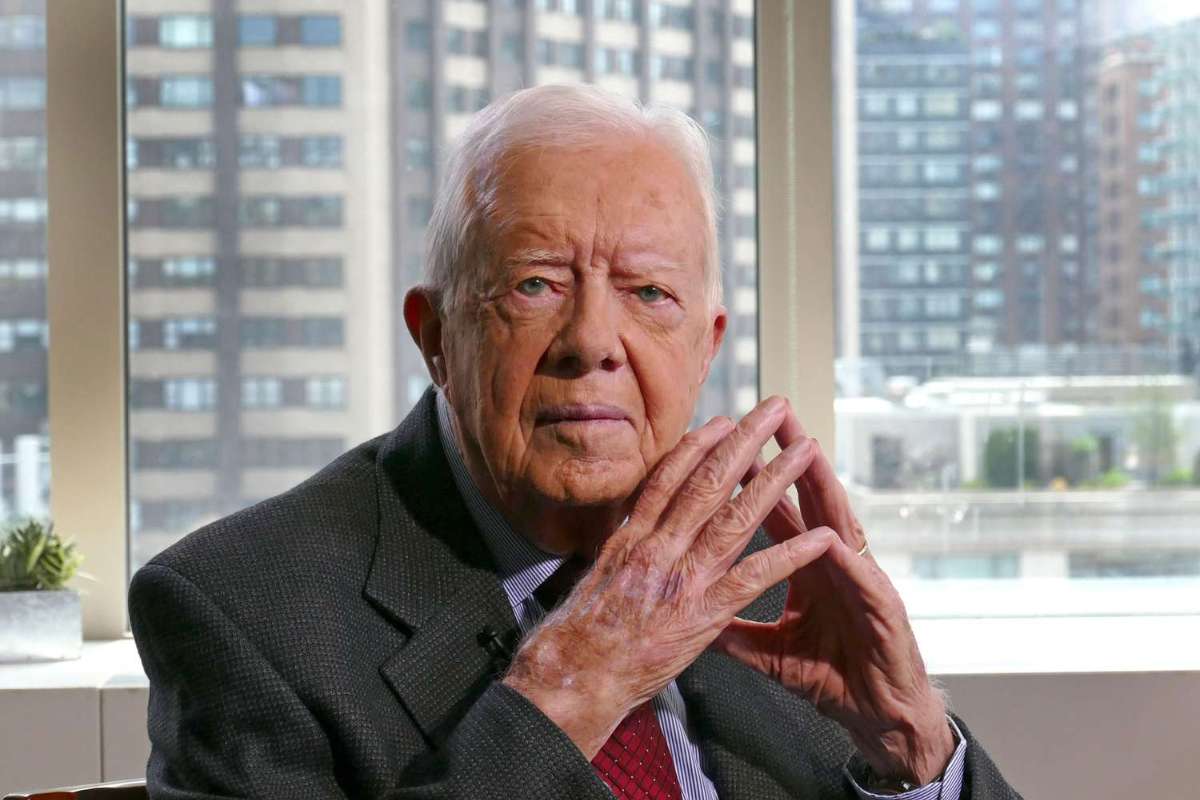Jimmy Carter, the 39th President of the United States and a Nobel Peace Prize laureate, passed away at the age of 100 on Sunday afternoon at his home in Plains, Georgia. Carter, who lived longer than any other U.S. president in history, leaves behind a remarkable legacy of public service, humanitarian efforts, and advocacy for peace and human rights.
Current and former leaders, including President Joe Biden and former President Donald Trump, led tributes to the former president, acknowledging his contributions to the nation and the world.
President Biden described Carter as a man of principle, faith, and humility who demonstrated the values of decency, courage, compassion, and strength. Biden urged Americans, especially younger generations, to study Carter’s life as an example of purpose and meaning.
Trump, in his tribute, recognized the challenges Carter faced as president during a pivotal time for the country and acknowledged his efforts to improve the lives of Americans. Trump emphasized that the nation owes Carter a debt of gratitude.
Global Leaders Pay Their Respects
World leaders also honored Jimmy Carter’s legacy. King Charles III recalled Carter’s dedication and humility, which inspired many, while also reflecting on Carter’s 1977 visit to the United Kingdom. British Prime Minister Keir Starmer praised Carter’s strong faith and values, highlighting his post-presidency work on social justice and human rights.
Ukrainian President Volodymyr Zelensky noted that Carter served during a time when Ukraine was not yet independent but still stood in solidarity with its ongoing fight for freedom. French President Emmanuel Macron recognized Carter as a steadfast advocate for the vulnerable and a tireless fighter for peace.
Carter’s Life and Presidency
Jimmy Carter rose from humble beginnings as a peanut farmer in Georgia to become the 39th president of the United States in 1977. Before his presidency, he served as a lieutenant in the U.S. Navy and later as the governor of Georgia.
Carter’s presidency was marked by both challenges and triumphs. He faced significant economic struggles, including high inflation and interest rates, and foreign policy challenges such as the Iran hostage crisis, which resulted in the deaths of eight Americans during a failed rescue attempt.
Despite these difficulties, Carter achieved a notable diplomatic success with the Camp David Accords in 1978, brokering peace between Egypt and Israel. However, this success was overshadowed by domestic economic woes, leading to his overwhelming defeat in the 1980 election to Ronald Reagan. Carter won only six states and Washington, D.C., in the election.
A Life of Service After the White House
After leaving the White House with low approval ratings, Jimmy Carter returned to his two-bedroom ranch-style home in Plains, Georgia, the same house he lived in before entering politics. He avoided the lucrative opportunities available to former presidents, such as publishing deals and after-dinner speeches, explaining that he had no desire to accumulate wealth.
Instead, Carter devoted his post-presidential years to addressing global issues such as inequality and disease. In 1982, he founded the Carter Center to promote democracy, human rights, and global health. For his efforts, Carter received the Nobel Peace Prize in 2002.
Carter also collaborated with Nelson Mandela to establish The Elders, a group of global leaders working to promote peace and human rights worldwide.
Personal Legacy and Family
Jimmy Carter is survived by his four children, 11 grandchildren, and 14 great-grandchildren. His wife, Rosalynn Carter, to whom he was married for 77 years, passed away in November 2023. Reflecting on their father’s legacy, Carter’s son Chip described him as a hero who embodied the ideals of peace, human rights, and unselfish love.
Carter was the oldest surviving U.S. president since the death of George H.W. Bush in 2018. After years of declining health, Carter opted to receive hospice care at his home last year. He had previously battled melanoma, which had spread to his liver and brain.
Tributes from Fellow Leaders
Former President Barack Obama praised Carter’s grace, dignity, justice, and service, recalling the lessons he taught through his actions and his enduring presence in the Maranatha Baptist Church in Plains, where Carter taught Sunday school into his 90s. Obama noted that Carter’s memory will continue to inspire others to embrace their better angels.
Bill and Hillary Clinton also honored Carter, emphasizing his deep faith and lifelong commitment to serving others. They highlighted how Carter’s actions exemplified selflessness and devotion to improving the world.
Jimmy Carter’s legacy as a leader, humanitarian, and advocate for peace will continue to resonate in the years to come, as the world reflects on his contributions to both the United States and the global community.











